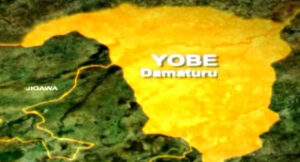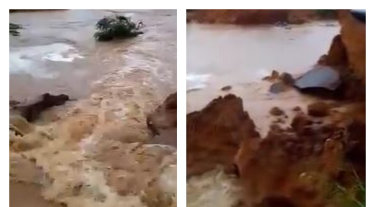A devastating situation is unfolding in Yobe State following a relentless downpour that has effectively cut off a major federal road linking Damaturu, the state capital, to several key Local Government Areas (LGAs) within Yobe, Borno, and Adamawa states. This critical road network, which connects Damaturu to Gujba and Gulani LGAs, as well as Biu, Hawul, Shani, Kwaya Kusar, and Gombi LGAs in neighboring Borno and Adamawa states, was severely affected by the torrential rains in the early hours of Tuesday. The downpour struck near Katarko village, located about 20 kilometers from Damaturu, causing a major disruption to travel and commerce in the region.
For the residents and travelers in the affected areas, the collapse of this federal road has compounded an already challenging situation. Mustapha Babagana, a local businessman who was en route to Biu for a business trip, shared his frustrating experience with news correspondents. According to him, the flooding and road collapse forced him to return to Damaturu and take a much longer alternative route through Gombe State. This detour added an additional 380 kilometers to his journey, significantly increasing both travel time and cost. Babagana’s story echoes the experiences of many other residents and commuters who are now faced with the daunting task of navigating around the collapsed infrastructure.
 The economic and social impact of this disruption is far-reaching. Yobe State, like many other regions in northern Nigeria, is heavily reliant on these federal roads to maintain the flow of goods, services, and people between its local governments and neighboring states. With the road near Katarko village now impassable, transportation in and out of 11 out of the state’s 17 local government areas has come to a standstill. This situation is even more dire considering that the Potiskum-Gashua, Damaturu-Dapchi, and Damaturu-Buni Yadi roads have also been affected by the heavy rains, leaving multiple regions completely cut off from the state capital.
The economic and social impact of this disruption is far-reaching. Yobe State, like many other regions in northern Nigeria, is heavily reliant on these federal roads to maintain the flow of goods, services, and people between its local governments and neighboring states. With the road near Katarko village now impassable, transportation in and out of 11 out of the state’s 17 local government areas has come to a standstill. This situation is even more dire considering that the Potiskum-Gashua, Damaturu-Dapchi, and Damaturu-Buni Yadi roads have also been affected by the heavy rains, leaving multiple regions completely cut off from the state capital.
The collapse of these key bridges and roadways has left thousands of residents stranded, with access to basic amenities and emergency services becoming increasingly difficult. For many, the roads serve as lifelines, linking rural communities to hospitals, markets, schools, and other essential services. The damage caused by the rains has not only hindered access but also threatened the livelihoods of many who depend on the road network for their daily activities, particularly farmers and traders who now face delays in transporting their produce and goods to markets.
The incident in Yobe State highlights the broader issue of infrastructure vulnerability in many parts of northern Nigeria. While seasonal rains are a common occurrence, the level of destruction caused by this latest downpour is a stark reminder of the fragility of critical infrastructure in the region. Flooding and the subsequent collapse of bridges and roads have become almost annual events in certain parts of the country, raising questions about the resilience of infrastructure in the face of climate change and increasing weather unpredictability.
For the residents of Yobe, Borno, and Adamawa states, the current situation is nothing short of tragic. With 11 local government areas unable to access Damaturu, there are growing concerns about the potential for food shortages, difficulty in accessing medical care, and economic downturns as trade routes remain blocked. The rainy season, which typically lasts for several months, means that this disruption could persist for an extended period if immediate action is not taken to restore the roads and bridges.
Calls are growing for both the federal and state governments to act swiftly in addressing the situation. Many residents have expressed frustration over the slow pace of infrastructure development and maintenance in the region, particularly in areas that are prone to flooding and other natural disasters. The current road collapse is not an isolated incident but part of a larger pattern of neglect that has left many rural areas in northern Nigeria vulnerable to infrastructural breakdowns during the rainy season.
In the meantime, residents like Babagana, who must travel hundreds of additional kilometers just to reach their destinations, are left to bear the brunt of the disruption. The heavy downpour may have stopped for now, but the ripple effects of the road collapse will likely be felt for weeks, if not months, as authorities scramble to address the damage and restore normalcy to the region. The collapse of the road near Katarko village serves as yet another reminder of the urgent need for sustainable infrastructure solutions in Nigeria’s most vulnerable regions.




